For the past eight years, Anthony Charles, MD, has built the Malawian Surgical Initiative, training Malawian surgeons to care for their own and providing transformative educational experiences for UNC medical students and residents.
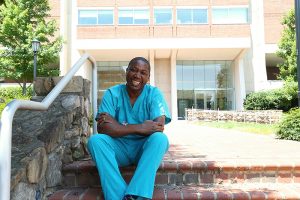
By Jamie Williams, jamie.williams@unchealth.unc.edu
Charles leads the Malawian Surgical Initiative, a partnership between the UNC Department of Surgery, Kamuzu Central Hospital in Lilongwe, Malawi, and the Malawi College of Medicine in Blantyre, Malawi.
On December 5, 2015, the first class of surgeons graduated from the five-year training program. And on that day, the number of trained surgeons in a country of 15 million people grew by six – to a total of 20. The goal is that they stay in their home country to serve their fellow citizens.
The graduation marked the beginning of a period of great expansion for the program, which has newly established partnerships with UNC’s departments of urology, neurosurgery, and anesthesiology.
Leading the initiative requires Charles – also an active trauma surgeon, and director of the adult ECMO program at UNC Hospitals – to navigate the challenges that come from coordinating a program from another continent and closely collaborating with a foreign government.
“This program is entirely built on trust, which has contributed to its success, but also makes it fragile,” Charles said. “We’ve done a lot of good, which I think has bought us some grace and good will, but all it takes is one person going down there and saying the wrong thing, and it can just come crashing down.”
For eight years now, Charles has kept that from happening.
“He is the glue,” said Bruce Cairns, MD, the John Stackhouse Distinguished Professor of Surgery at the UNC School of Medicine and director of North Carolina Jaycee Burn Center. “The reason the program is successful is because of his efforts. In Malawi, our involvement is a socio-political issue as much as a health care issue. Each linkage we make there has to be through an individual; a committee won’t work. And what we have with Anthony is someone who has the unique capacity to connect all of the dots.”
An International Perspective
Charles was born in Germany to Nigerian parents, who met while his father was studying medicine in Heidelberg and his mother working as a nurse at a military base. When Charles was 3, the family moved back to Nigeria, where his father began a successful career as a pediatrician, educator, and administrator.
His father became medical director of Guinness’ philanthropic health outreach efforts in Nigeria. Guinness Beer is a national favorite in Nigeria. In fact, the first Guinness brewery outside of the UK was actually built in Nigeria’s largest city: Lagos. One of the perks of working with the beer giant was the opportunity for Charles’ father to send his children to boarding school in Ireland.
So, from the ages of 9 through 18, Charles lived and studied in Ireland, before returning to Nigeria to attend medical school at the University of Lagos. Residency training took him to London where he met his wife, a native of Los Angeles. When her time was up in London, Charles came with her to LA, completing his general surgery residency at Martin Luther King Medical Center, an inner-city hospital with an abundance of trauma cases.
After a trauma and critical care fellowship at the University of Michigan, Charles arrived at UNC in 2006. Central to his progress in academic medicine, he said, was the decision to pursue his master’s degree at UNC Gillings School of Global Public Health.
Through his public health studies, Charles became aware of the infectious disease work UNC was leading in Malawi. He traveled to Africa to see it for himself and learn how he might become involved.
A Foundation
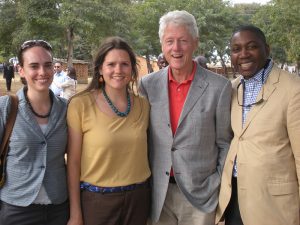
UNC’s Project Malawi was founded in 1990 as a partnership with the Malawi Ministry of Health with a focus on providing technical assistance in the design of clinical management guidelines aimed at stemming the country’s rate of HIV. By the time Charles visited in 2007, UNC’s presence there had grown to hundreds of people including physicians and researchers, medical specialists, medical and clinical officers, nurses, laboratory and pharmacy technicians, data officers, administrators, and logistical support staff.
Through the great successes of UNC’s Project Malawi, Malawians with HIV and other infectious diseases had access to effective treatments. But access to trauma care was much more limited.
“In Malawi, injuries account for more deaths than tuberculosis, AIDS, and Malaria combined,” Charles said.
However, in a country of 15 million people, there were only 14 trained surgeons. Charles said 10 percent of trauma patients were dying in the hospital and untold others were seeing their future economic prospects disappear because of the burdens of their medical conditions.
“Say you’re a carpenter and you ride your bike to work; if you break your ankle you can’t work and your family’s income is gone,” Charles said. “If we can fix the ankle, then that person is back to work, and we help that family and the country as a whole. At the time, Malawi didn’t have the capacity to help these people.”
Charles saw an opportunity to expand upon the solid foundation of UNC’s Infectious Disease work with a surgical training program. But, from the start, he was adamant on training Malawian surgeons in their home country.
“When we set out to do this, we never had the intention of bringing American-style care to Malawi – that would be impossible. But, what we wanted to do was foster Malawian care provided by Malawian surgeons,” Charles said.
Convincing the Government
In order to get the program up and running, Charles set out to convince the Malawian government of both its economic and social value. Traditionally, the government had paid for surgical trainees to go to South Africa or Europe to receive their training. Some returned home, many did not.
“There are more Malawian surgeons in Glasgow than in Malawi,” Charles said.
The government was spending on average more than $60,000 per year funding training of their surgeons in other countries, said Charles. If those surgeons never returned to Malawi to practice, none of that investment was recouped.
It costs $15,000 per year to train a surgeon through the Malawian Surgical Initiative.
Funded through public, private and corporate philanthropy, the Initiative covers half of the expenses for students, including a stipend, books and other learning materials, and funding for travel to academic conferences. The rest is covered by the Malawian government.
The curriculum was developed by Charles and others at UNC and is taught by visiting faculty and residents from UNC in collaboration with faculty from Norway’s University of Bergen. The program is fully accredited by the College of Surgeons of Eastern, Central and Southern Africa.
He’s also honed his diplomatic touch.
“One of the skills that I’ve acquired over the years is the ability to convince the government officials to do what will be most advantageous for the program without making it seem like I am making demands,” Charles said. “The fact that I am an African is not lost on them, but I’m still a foreigner and there is still some skepticism, so I just have to ensure what I’m suggesting will work and they will look good in the end.”
The fluid nature of the nation’s civil service means Charles always has to plan for contingencies. What if a new health minister doesn’t like the program? What if he favors the old model of just sending surgeons abroad for training rather than supporting the necessary infrastructure required for in-country training? What if strife within the government threatens the funding?
“There’s an African saying: ‘When two elephants fight, it is the grass that suffers,’ and so my job has always been to make sure that the program doesn’t suffer. I always have to be thinking ahead,” Charles said.
Comprehensive Training
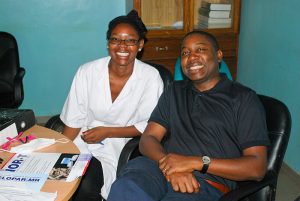
It takes more than just a surgeon to perform a surgical procedure, and the Malawian Surgical Initiative provides training and education for Malawians interested in a wide range of health careers. From the start, they have offered nursing training. In addition, there are plans underway to introduce a partnership through UNC’s Department of Anesthesiology to provide Malawians training in that discipline as well.
“We recognized early on that just training surgeons wouldn’t be enough,” Charles said. “We have very active educational programs for non-physicians who are interested in surgical care and a large part of that is assisting with procedures, but we also are able to make sure they have the resources to go into the community and provide some education to their communities.”
The hospital can then be an economic driver, providing good, sustainable jobs to people while also helping improve the health of the nation.
Charles also emphasized the training of women. The nursing roles, he said, have always been dominated by women. But, they are also training female surgeons. In Malawi, much like the United States, surgeons have always been overwhelmingly male. But Charles said the training of more female surgeons will help foster the sustainability of the program.
“We’ve seen in Malawi that men are more likely to take the increased training and salary potential and move elsewhere,” Charles said. “In our experience, the women have stronger community roots, making them much more likely to stay.”
Bringing it Back Home
From the start, the Malawian Surgical Initiative has provided training opportunities for UNC’s medical students and residents. Charles said the experience in Malawi can “fundamentally change” the world outlook of students who participate.
“Each time I take a new medical student it blows their mind that amidst such immense poverty there is such great pride,” Charles said. “Going down there, realizing you aren’t going to save the world through your mere presence has a way of changing the way you think about solutions, it’s incredible.”
Humility is the key.
“The one lesson I try to emphasize the most to our students is simple: respect everyone,” Charles said. “No matter what you’re used to and how much of a hurry you may be in to get things done, we will do it at the Malawian’s pace. You really have to take a step back and realize whose country you are in, and whose people you are helping to treat.”
What the students learn there is how to creatively solve problems in an environment that does not have the unlimited resources of the operating rooms that they are used to. They learn to work with teams and to consider the true efficacy of the procedures and tests that they order for patients.
By working alongside the Malawian physicians and treating Malawian patients, Charles said UNC’s students gain a perspective that will be beneficial throughout their careers.
“In this immersive experience, the students are seeing people that don’t look like them, don’t speak their language and are remarkably less fortunate. The ability to thrive in that environment is incredibly beneficial,” Charles said. “Those lessons are pertinent here in Chapel Hill as we see patients from all different backgrounds, and, as a public hospital, provide care for them all.”
Cairns agreed.
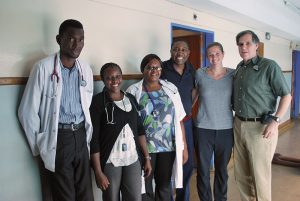
“Surgery is intensely personal; and the reality that each individual matters equally is inescapable in an operating room,” Cairns said.
Caring for Burns
The North Carolina Jaycee Burn Center has been a partner in the Malawian Surgical Initiative from the beginning, and in 2014, that partnership culminated in the formal establishment of a dedicated burn unit at Kamuzu Central Hospital in 2014.
“Burn is a disease of poverty,” Charles said. “We know that 90 percent of the world’s burns occur in undeveloped countries where much of the cooking is done on open flame, or a family’s economic circumstance dictates that they don’t have the resources for sufficient childcare and you’ve got children running around unsupervised. Seventy percent of the burn victims in Malawi are under the age of 10.”
The burn unit in Malawi is funded largely through a partnership with Johnson & Johnson. Charles said the company was interested by the model they used to train nurses, and offered further training for Malawian nurses at a Johnson & Johnson facility in Johannesburg.
Charles said it has been an incredible partnership.
“It’s been gratifying that they have shown such support of our work, and we’ve seen that their philanthropy is completely divorced from their business interests. They are there to do good, not sell products,” Charles said.
The Malawian resident physicians provide care to patients, as do visiting physicians and residents from UNC. UNC surgery resident, Joanna Grudziak, MD, is currently Malawi for one year to work in the unit.
In order to properly treat burns, nutrition is key. So, Charles is helping develop a nutrition program. When a person suffers a burn, Charles said, the body uses up a great deal of calories in its attempts to heal. The patient’s diet must be modified and closely monitored.
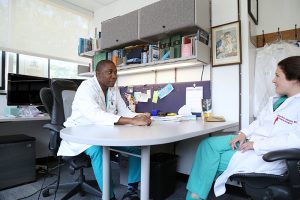
“We believe that the burn unit is the ideal environment for a nutrition program to achieve optimal results and reduce burn mortality as 60 percent of our patients are malnourished” Charles said.
Defining Success
Now that the first class of trainees has graduated, Charles has focused on ensuring that they are fully prepared for their future. He worries that many will be thrust into administrative roles for which they are not ready. He’s working with the government to make sure that they receive leadership training. He is also working with the government on solutions for providing adequate compensation for their work.
“Botswana is only a short flight away, and these surgeons could easily double or triple their salaries there, which we have to fix,” Charles said.
There is still work to be done to improve the program, but one measure of success already achieved is the drastic reduction of surgical mortality at Kamuzu Central Hospital.
“We have more Malawian doctors and more nurses now. Increasing health care personnel saves lives and we have seen great success there,” Charles said.
The ultimate success, though, will come when Charles’ regular trips to Malawi cease.
“The crowning achievement will be when we aren’t there anymore and the training program is running itself with Malawians leading it,” Charles said. “We are getting there, and I hope that happens in the next decade.”
Until then, though, Charles will remain as a teacher, a leader, a steady hand, and a voice of reason. He’ll continue to build, deliberately, step-by-step.
“If you build the system around trauma, you can deliver the whole of medicine, and that’s where we’re heading,” Charles said. “I truly believe the greatest gift you can give any society is the capacity to care for its own people.”